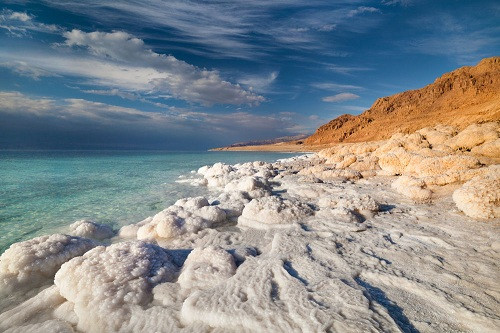Why is the Dead Sea saltier than ocean water?
The Dead Sea is located in a low-lying desert, and has a faster evaporation rate than the ocean, making the lake saltier than seawater because of its higher salt concentration.
 |
| Salt accumulates in mountains around the shores of the Dead Sea. Photo: Shutterstock |
The Dead Sea is an inland lake that borders Jordan, Israel, and Palestine, according to Live Science. It is recognized as one of the saltiest bodies of water in the world.
No fish, birds or plants can survive in the highly salty environment of the Dead Sea. The water is nearly 10 times saltier than normal ocean water.
Salt on Earth
The Earth’s oceans are about 3.5 percent salt, according to the National Oceanic and Atmospheric Administration (NOAA). This salt comes from rocks on land. Acids in rainwater break down rocks, trapping ions in the rocks and carrying them out to sea. Most of these ions are sodium and chlorine, which combine to form salt in the ocean.
If we removed the salt from the water, we would get about 50 million billion tons of salt, forming a 153 meter thick layer of salt covering the Earth, equivalent to the height of a 40-story building.
Salt in the Dead Sea
NOAA estimates that the Dead Sea is 5-9 times saltier than ocean water. The salinity of seawater depends on depth. At 100 meters below sea level, the water is saturated with salt and cannot dissolve any more, causing the salt to accumulate on the seafloor.
The Dead Sea lies in a valley that stretches more than 1,000 kilometers, starting in the Sinai Peninsula and extending north into Türkiye. This area is the lowest point on Earth, at 429 meters below sea level. A series of lakes once existed in this valley and disappeared 15,000 years ago, leaving only the Dead Sea, according to the Minerva Dead Sea Research Center (MDSRC).
Freshwater from the Jordan River is the only source of water that flows into the Dead Sea. However, there are no channels or streams that carry water from the lake to the ocean. Water accumulates in the Dead Sea and evaporates faster than seawater in the ocean, making the Dead Sea saltier than the ocean, the MDSRC explains.
The Dead Sea is dying
In recent years, human exploitation of water from the Jordan River for agricultural irrigation has depleted the Dead Sea of valuable water, making the lake's water increasingly saltier.
In fact, the Dead Sea is slowly disappearing. The lake's water level is dropping about a meter per year, according to a 2010 study published in the journal Environmental Economics. The researchers said the Dead Sea has dropped about 30 meters since the early 20th century.
Another study found that, even without human intervention, the Dead Sea is at risk of disappearing. In 2010 and 2011, scientists conducted geological drilling at the bottom of the lake. They discovered that about 120,000 years ago, the Dead Sea had completely dried up, leaving only a layer of salt on the surface.
The future of the Dead Sea is uncertain. Despite signs that the lake may disappear, in 2011 it continued to surprise scientists.
A drone has for the first time ventured to uncharted depths and discovered a freshwater spring containing bacteria at the bottom of the Dead Sea. Scientists are looking forward to uncovering more mysteries about this lake.
According to VNE
| RELATED NEWS |
|---|



.jpg)
.jpg)



